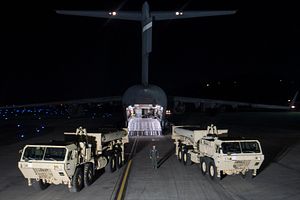SINGAPORE — This year’s Shangri-La Dialogue, Asia’s premier security forum, was the first to take place since the United States and South Korea decided jointly last year to proceed with the deployment of a Terminal High Altitude Area Defense (THAAD) system. THAAD, as The Diplomat has discussed before, has faced strong opposition from China and also from Russia, though not quite to the same degree.
Beijing’s opposition to the system led to a series of unofficial sanctions against South Korean entities, including the Lotte Group, the South Korean conglomerate that transferred land to the South Korean government to allow for the system’s deployment. Ultimately, South Korea’s decision to host THAAD led to a swift freeze in South Korea-China bilateral ties, which had been quickly improving throughout 2015.
At the Shangri-La Dialogue this year, the issue of China’s opposition to THAAD came up at multiple sessions. While Beijing did not send high-level military representation, Maj. Gen. (Ret.) Yao Yunzhu stated the Chinese case at a special session on nuclear issues in the Asia-Pacific. Maj. Gen.
Yao, who is director of the Center on China-American Defense Relations, primarily couched China’s opposition to the deployment on the system by focusing on the advanced AN/TPY-2 X-band radar and its perceived effect on strategic stability between the U.S. and China.
She added that China feared the early warning advantages that the United States would gain from the emplacement of an AN/TPY-2 radar in South Korea, which she additionally assessed as excessively powerful for limited terminal missile defense use on the Korean peninsula.
On Sunday, at the final plenary session of this year’s Dialogue, Russian Deputy Defense Minister Lt. Gen. Alexander Fomin addressed Moscow’s opposition to THAAD as well. During his speech to the plenary session, Fomin stated that Russia had concerns about the THAAD deployment, which he said would negatively affect Russian security.
During the question-and-answer portion, when asked to go into more detail about why specifically Russia opposed the THAAD deployment, Fomin, instead of discussing the plausible reach of the X-band radar in forward-basing mode, said that THAAD was a “dual use” system and could fire “attack missiles.” (No publicly available information supports Fomin’s assertion that THAAD can be operated as an offensive system.)
Fomin also added that Russia opposed the deployment of further theater ballistic missile assets in Japan. Tokyo is considering its own THAAD batteries amid an intensifying North Korean challenge. Fomin cited the proximity of a potential THAAD system in Japan to the disputed Kuril Islands as a cause for concern.
Fomin, however, did not express any concerns about Northeast Asian THAAD emplacements negatively affected strategic stability between the United States and either China or Russia. For now, Russia and China appear to each be pursuing different cases against the deployment of THAAD in the region.

































